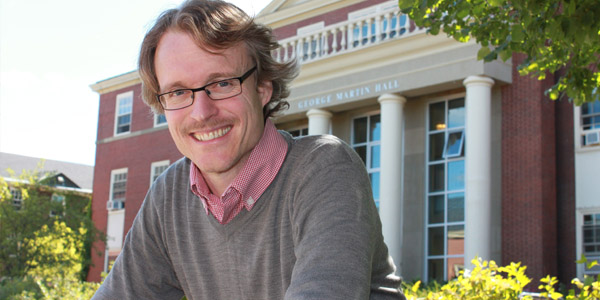Matthew Hayes, St. Thomas University’s new Canada Research Chair in Global and International Studies, said he hopes to draw attention to the lives of those who are disadvantaged by existing social structures.
“No one’s accomplishments in life are only the result of their own efforts,” the sociology professor said.
“If we don’t want the same types of people to be the ones who get to talk about global inequalities, we need to always keep an eye on the structural conditions that produce advantage, and fight like hell to change them.”
Hayes’ research is focused on North-South transnational migration which studies how the lives of migrants from North America and Western Europe play out across the borders of their home countries and the places they move or retire to.
“I want to think of migration as a global social process, one which encompasses a diversity of different forms of mobility that shed light on inherited structural inequalities,” he said.
Hayes first began exploring the topic in late 2010 while visiting friends in Ecuador. He realized American retirees were moving there permanently because of financial insecurity in the United States and loss of retirement income.
His research was not initially focused on Latin America. A network of Latin American scholars from his academic career, as well as an interest in economics, helped direct Hayes to the questions he is studying now.
“I thought that it was a story that the academic community was not talking about, and it also fit my interest in doing ethnographic and qualitative work on how social class formations in the Global North were shifting.”
Scholarship on Latin America often emphasizes the region’s economic dependency and subordination to powerful foreign interests. This is largely impacted by colonial and post-colonial influences.
“My work views this North-South migration as a continuation of colonial processes, which are based on a hierarchical global division of labour, that organizes and remunerates work differently for different types of racialized bodies,” Hayes said.
“Latin Americans moving to the U.S. or Canada face very narrow legal means of entering, discrimination once they do … [while] North Americans are treated in almost entirely opposite ways. Local communities in Latin America compete to attract them, either as real estate investors or as tourists.”
Hayes said the position of a Canada Research Chair is an honour that also requires responsibility.
“I have been able to get this Chair in part because I have inherited the advantages of an unequal global society … As a scholar and intellectual, I also have a duty to point out some of the structural advantages that permit me and others who look like me to benefit from structural social conditions.”

